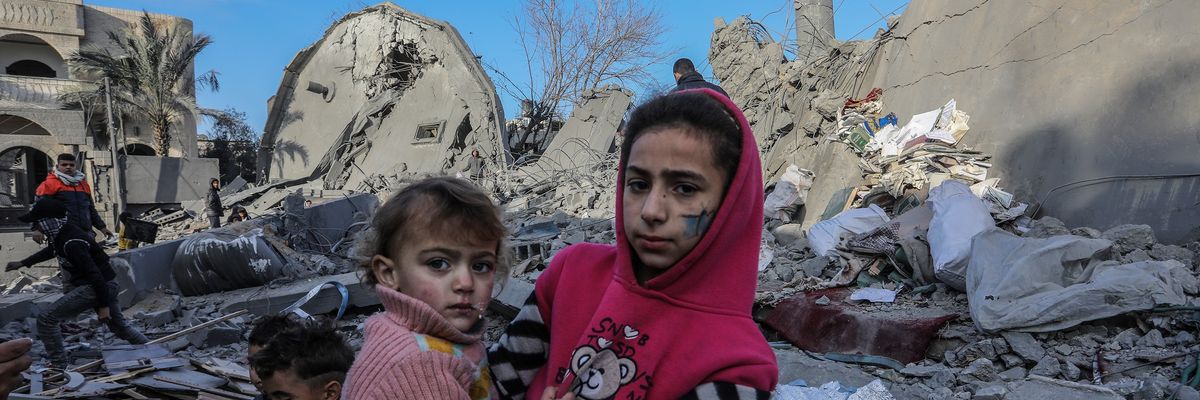A global human rights coalition expressed hope Thursday that the imminent verdict by the International Court of Justice will be a step toward "stopping the genocide in Palestine" as authorities in Gaza reported new attacks on civilians and alleged violations of international law.
The ICJ said this week that it will announce its verdict on Friday at 7:00 am ET in the genocide case brought by South Africa against Israel.
The verdict comes two weeks after South African officials presented evidence not only that Israel is carrying out the "mass killing of Palestinians in Gaza," but also that top Israeli officials have made clear that their goal in the military operation that's now stretched on for nearly four months is to clear Gaza of the 2.3 million people who live there—either by killing them with air and ground attacks or by forcing them to leave.
Along with United Nations officials, international human rights experts, and a growing number of policymakers from across the globe, South Africa has argued that Israel is engaged in a genocidal assault in Gaza and has committed numerous violations of international law. The country called on the ICJ to adopt "provisional measures" to force Israel—which does not recognize the court's jurisdiction but is a party to the Genocide Convention—to stop its mass killing and displacement of Gazans.
Rights groups including the PAL Commission on War Crimes, the International Coalition to Stop Genocide in Palestine (ICSGP), the Global Legal Alliance for Palestine, and the Palestinian Assembly for Liberation (PAL) said Thursday that they plan to hold a press conference outside the U.N. headquarters following the announcement of the verdict.
Regardless of the ICJ's decision, noted PAL Commission on War Crimes founder Lamis Deek, South Africa and its supporters will have to determine "how to deal with the anticipated U.S.-Israeli obstruction of that decision."
"On Friday we will respond to the court's decision and issue calls on state parties to the ICJ and the Genocide Convention as regards their compliance obligations, and address our legal colleagues and our communities regarding the next steps we think will be most critical on the heels of this decision," said Deek. "The brutal Israeli genocide and torture in Gaza, alongside the targeted assassinations, destruction of civilian infrastructure including all of Gaza's hospitals and universities, blocking of aid, and use of starvation and spread of disease as a war tactic, constitute a grotesque series of the highest war crimes."
"The situation in Khan Younis underscores a consistent failure to uphold the fundamental principles of international humanitarian law: distinction, proportionality and precautions in carrying out attacks."
Should the court rule in South Africa's favor, added Adrienne Pine, co-coordinator of the ICSGP, "it is the international community's responsibility to ensure that Israel obeys this verdict without delay."
Ahead of the ICJ's verdict, the death toll in Gaza reached at least 25,700, including at least 10,000 children. Israel has claimed that it is targeting Hamas in retaliation for its October 7 attack, and numerous top officials have said they view all Gaza residents as legitimate military targets—a potential violation of the Geneva Conventions, which prohibit collective punishment of a population for the actions of a government or armed group.
On Thursday, human rights experts made clear that Israel's assault is showing no signs of slowing as the world awaits the verdict, with U.N. Relief and Works Agency (UNRWA) affairs director Thomas White reiterating that attacks on civilians are "utterly unacceptable."
White said fighting intensified in Khan Younis near hospitals, shelters, and a UNRWA training center, all of which are hosting displaced people.
"Twelve people have now been confirmed dead with over 75 injuries, 15 of whom are in a critical condition. Yesterday, the center was hit by two shells and caught fire," said White. "Heavy fighting near the remaining hospitals in Khan Younis, including Nasser and Al Amal, has effectively encircled these facilities, leaving terrified staff, patients, and displaced people trapped inside. Al Khair hospital has shut down after patients, including women who had just undergone C-section surgeries, were evacuated in the middle of the night."
"The situation in Khan Younis underscores a consistent failure to uphold the fundamental principles of international humanitarian law: distinction, proportionality, and precautions in carrying out attacks," said White. "This is unacceptable and abhorrent and must stop."
Al Jazeerareported that at least 20 Palestinians were killed and 150 more were injured when the Israel Defense Forces (IDF) launched an attack on people waiting for humanitarian relief in Gaza City.
"The Israeli occupation committed a new massacre against thousands of hungry mouths who were waiting for aid," said Ashraf al-Qudra, a spokesperson for the Gaza Ministry of Health—whose reporting on casualties has long been backed by the U.N.
Meanwhile, the Palestinian Environmental Quality Authority warned that two-thirds of Palestinians in Gaza are now suffering from water-borne illnesses because Israel's blockade on fuel and aid has left the enclave without sufficient potable water and the ability to run desalination plants.
Deek said the ICJ's verdict "could profoundly reshape the geopolitical and legal topography" of how the world responds to Israel's treatment of Palestinians.
"Billions of people have been waiting with bated breath for this historic moment," said Deek, "that is poised to change international and domestic approaches—military, legal, and political—to stopping the genocide in Palestine."
